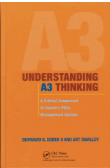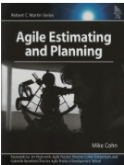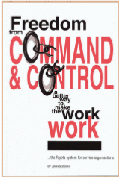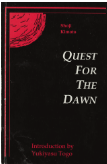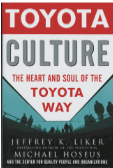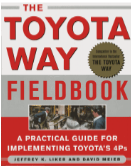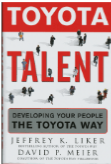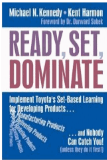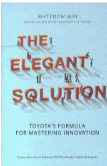Michael N. Kennedy: Product Development for the Lean Enterprise, Why Toyota's System is Four Times More Productive and How You Can Implement It, The Oaklea Press, 2003, ISBN 1-892538-09-1
(254 pages, 155*235 mm)
Toyota product development

Michael Kennedy describes the product development process of Toyota. We get to follow a crash team that is given one week to come up with ideas for saving a company that once was the industry leader but now face serious problems.
Each chapter of this novel is followed by a short discussion where the author quickly summons up, comments and enlarges the subject matter. In this way it becomes really exiting and much more appetizing then if the Toyota product development had just been described in strict formal way.
Because, as you have guessed, the answers are found at industry leader Toyota. The engineers at Toyota have an 80% efficiency, compared to 40% for Scandinavian companies and 20% for North American companies.
The potential for improvement is huge, but to utilize it a paradigm shift is necessary, just to apply new methods is not enough and this is the subject of the book.
Michael Kennedy´s message to american industry is: "change or die". He and Dr. Allen Ward, University of Michigan, have experienced enormous difficulties in finding acceptance for facts. Companies are really reluctant to improve their product development. For example the statistics for GM & Ford is terrible compared to Toyota and Honda. In 2003 the profit of Toyota was a record US$ 8 billions, and more than twice as big as GM and Ford combined.
Toyota´s product development has for cornerstones.
- Chief engineer - Automotive projects are managed (owned) by a chief engineer, who has an entrepreneurial character. He makes all the decisive decisions at integration points (milestones). Managers function as teachers for subordinates
- Set-based Concurrent Engineering - You keep alternative solutions alive as long as possible. Stuart Pugh-type diagrams of characteristic variables are used. Milestones are system integration points where the number of alternativs is reduced.
- Responsibility-based Planning & Control - Planning is pushed down to those who actually do the work.
- Expert Engineering Workforce - engineers are rewarded for being engineers not administrators. Contrary to American and Scandinavian industry Toyota still have a hierarchy based on engineering skill.
The Toyota paradigm and the description of it given in the book is very interesting and it is striking how much in common the Toyota paradigm have with Dynamic Product Development, a method, way of thinking or attitude, developed and described by professor Stig Ottosson in numerous articles and a textbook (in Swedish).
But DPD is not as coarse as the Toyota method, which operates at a higher hieratical level. I think that the two could easily be united and thereby strengthen each other.
Shoji Kimoto, Quest for the dawn, Dougherty Co (1991), 253 pages,
ISBN-10: 1878150014,
ISBN-13: 978-1878150011
( pages, mm)
Mike Cohn, Agile Estimating and Planning (Paperback), Prentice Hall (10 Nov 2005), ISBN-10: 0131479415,
ISBN-13: 978- 0131479418,
(368 pages, 234*175 mm)
Jeffrey Liker & David Meier, Toyota Talent: Developing Your People the Toyota Way (Hardcover), McGraw-Hill Professional; 1 edition (1 Jun 2007),
ISBN-10: 0071477454,
ISBN-13: 978-0071477451, (240 pages, 232*156 mm)
Durward K. Sobek & Art Smalley, Understanding A3 Thinking: A Critical Component of Toyota's PDCA Management System (Hardcover), Productivity Press (12 Mar 2008), 184 pages, ISBN-10: 1563273608, ISBN-13: 978-1563273605, 23.1 x 15.5 x 1.5 cm
John Seddon, Freedom from Command and Control: A Better Way to Make the Work Work (Paperback), Vanguard Consulting Ltd (1 Oct 2003), 300 pages, 0954618300, 978-0954618308, 22.6 x 15.6 x 1.8 cm
Jeffrey Liker & David Meier, The Toyota Way Fieldbook: A Practical Guide for Implementing Toyota's 4Ps (Paperback), McGraw-Hill Professional (1 Nov 2005),
ISBN-10: 0071448934, ISBN-13: 978-0071448932,
(476 pages, 234*185 mm)
Jeffrey Liker & Michael Hoseus, Toyota Culture: The Heart and Soul of the Toyota Way (Hardcover), McGraw-Hill Professional; 1 edition (1 Jan 2008),
ISBN-10: 0071492178,
ISBN-13: 978-0071492171, (288 pages, 229*163 mm)
Michael N. Kennedy & Kent Harmon, Ready, Set, Dominate: Implement Toyota's Set-Based Learning for Developing Products and Nobody Can Catch You (Hardcover), Oaklea Press (9 Jul 2008),
ISBN-10: 1892538407,
ISBN-13: 978-1892538406,
(296 pages, 231*152*25 mm)
Matthew May, The Elegant Solution; Toyopta's formula for mastering innovation, Simon & Schuster UK, 2007,
ISBN-13: 978-1-184737-027-3,
(236 pages, 233*152 mm)
This is the follow-up to Mike Kennedy's Product Development for the Lean Enterprise. So, what's new? Well, Kennedy & Co have come to the realization that product developoment is a learning process (as can be learned elsewhere on this website) and that it is a question of making use of the latest gained knowledge, not to proceed until one has relevant knowledge, etc.
In order to produce and harvest the needed knowledge, Toyota has designed a knowledge management system that really works.
It is armed with these new insights that the hero saves the company from outsourcing and sell-out of unprofitable divisions. Because exactly as in the previous book, the ideas have been dramatized and are presented in the form of a business novel to which has been added a couple of case stories.
Not as good as the previous book. One reads about what the persons think and say, but not about what the essence of Toyota's method really is. That one must find elsewhere. It doubtful whether one should read this book. It is probably better to spend ones energy on one of Liker's books.



